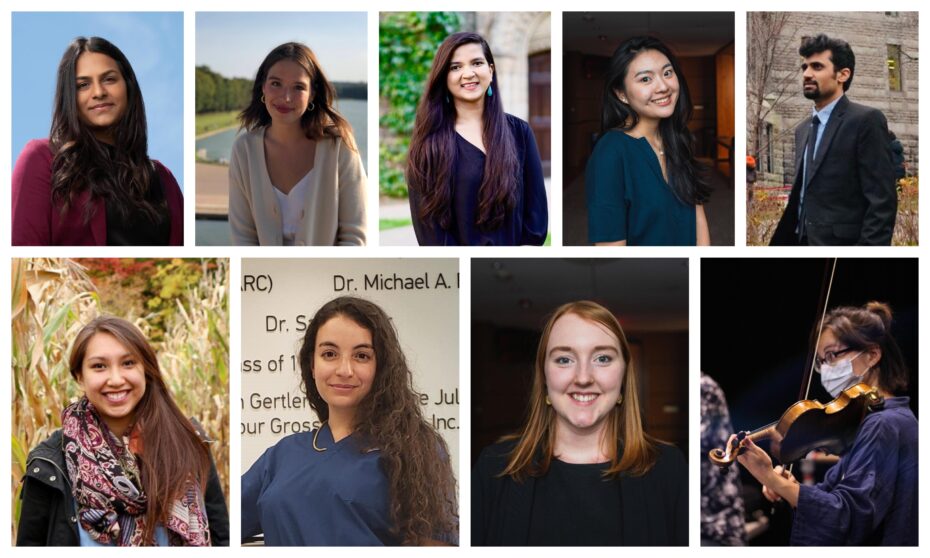
Fifty students from across Canada have been named as finalists for this year’s McCall MacBain Scholarships, Canada’s first comprehensive leadership-based scholarship for master’s and professional studies. Included on the shortlist are nine McGill students and recent graduates.
The scholarship enables students to pursue a fully funded graduate degree at McGill while participating in an intensive leadership development program. McCall MacBain Scholars are matched with mentors, advisors, and coaches who will accompany them on their journey.
The scholarships were launched in February 2019 by a landmark $200 million gift from John and Marcy McCall MacBain – the largest single donation in Canadian history at the time. The first cohort of 20 McCall MacBain Scholars began their fully funded master’s or professional degrees at McGill in September 2021.
The 2022 finalists were chosen based on their character, community engagement, leadership potential, entrepreneurial spirit, academic strength, and intellectual curiosity.
“The McCall MacBain Scholarship finalists have demonstrated empathy, integrity, and courage in a rapidly changing world,” said Natasha Sawh, Dean of the McCall MacBain Scholarships. “While their undergraduate experiences may have differed from what they initially expected, these students have dedicated their time and talents to a wide array of initiatives. They have distinguished themselves through their commitment to meaningful social change.”
Meet the McGill finalists
Three current McGill students and six recent graduates are among the 50 finalists:
- A dental medicine student, Sabrina Bouferguene is involved with various initiatives which seek to encourage and guide students who have fewer opportunities. Bouferguene contributes to Dent
 Ma Maison, which offers oral health care to seniors in their homes, and serves on the Faculty of Dental Medicine and Oral Health Sciences’ Equity, Diversity, and Inclusion Committee. She also represents the DMD program within the Widening Participation committee and co-founded the McGill Dentistry French Club, which offers French lessons to students. Bouferguene is applying to start a Master of Science with the Faculty of Dental Medicine and Oral Health Sciences.
Ma Maison, which offers oral health care to seniors in their homes, and serves on the Faculty of Dental Medicine and Oral Health Sciences’ Equity, Diversity, and Inclusion Committee. She also represents the DMD program within the Widening Participation committee and co-founded the McGill Dentistry French Club, which offers French lessons to students. Bouferguene is applying to start a Master of Science with the Faculty of Dental Medicine and Oral Health Sciences.
- While pursuing her undergraduate studies at McGill, Janelle Brown-Walkus (BSc’18) helped run AISES, a campus group for Indigenous students in science, technology, engineering and mathematics, and co-ordinated First Nations, Métis, and Inuit youth outreach for the McGill chapter of Let’s Talk Science, an outreach program to support edu
 cation and youth development. Brown-Walkus also started a non-partisan club for public policy discussions, served on the executive team of the McGill Pre-Dental Student Society, and worked as a program coordinator for McGill’s Indigenous Mentorship Program. She recently earned a Master of Science in Dentistry degree from the University of Toronto, where she wrote a thesis on First Nations perceptions of quality preventive oral health care in First Nations communities. Her goal is to enter the professional Undergraduate Dental Program (DMD) at McGill to improve dental care for Indigenous peoples across Canada. “I feel very honoured to be a finalist,” she said. “Getting to dental school has been a bit of a roller coaster and this opportunity has allowed me to reflect on that journey. My younger self is incredibly proud of where I am today.”
cation and youth development. Brown-Walkus also started a non-partisan club for public policy discussions, served on the executive team of the McGill Pre-Dental Student Society, and worked as a program coordinator for McGill’s Indigenous Mentorship Program. She recently earned a Master of Science in Dentistry degree from the University of Toronto, where she wrote a thesis on First Nations perceptions of quality preventive oral health care in First Nations communities. Her goal is to enter the professional Undergraduate Dental Program (DMD) at McGill to improve dental care for Indigenous peoples across Canada. “I feel very honoured to be a finalist,” she said. “Getting to dental school has been a bit of a roller coaster and this opportunity has allowed me to reflect on that journey. My younger self is incredibly proud of where I am today.”
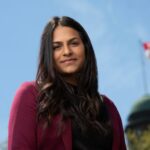
- Aastha Goyal is president of the Engineering Undergraduate Society, which oversees more than 60 student clubs, committees, and teams. She started Engaged Learning in Engineering (ELINE), a committee that hosts events to help students improve their learning methods, and she led outreach for a student club seeking to improve the presence of women in engineering. Goyal also led an intramural volleyball team and has worked as a teaching assistant for four terms. She is applying for master’s programs that will allow her to research the design of new materials, which may be used for production of batteries, solar panels, and semiconductors to meet clean energy demands. As an intern, she has worked on several renewable/hybrid power and hydrometallurgy projects.
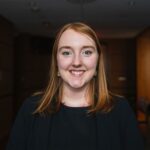
- Originally from Alberta, Michelle Hahn-Baker (BA’20) co-edited the English department’s undergraduate academic journal, and edited fiction submissions for the Scrivener literary journal. Hahn-Baker also mentored students through the McGill Arts Internship Office, and co-developed a website to help students with disabilities navigate study spaces and resources. “I’m really grateful for my undergraduate experience at McGill, which let me combine my academic pursuits with professional development and volunteer opportunities,” she said. “This taught me about the value of discovering the causes I care about and getting involved in lots of different areas, stepping outside of my comfort zone.” Since graduation, Hahn-Baker has been working in communications for the United Nations Convention on Biological Diversity. She is applying is applying for master’s programs in Geography and Public Policy.
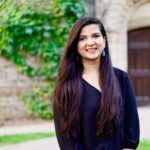
- Nousin Hussain (BSc’17) completed her undergraduate studies at McGill as a Loran Scholar and hopes to return to her alma mater for medical school. She currently works as an epidemiologist for the Public Health Agency of Canada. She co-leads a South Asian allyship network, organizing webinars and advocacy campaigns, and has volunteered as a knowledge translation specialist, collaborating on designing culturally responsive programs. As co-founder of an infectious disease working group, she created a COVID-19 educational toolkit and collaborated with 211 Ontario to develop Reconnect, a tool to help marginalized communities navigate local COVID-19 supports. Hussain has a Master of Public Health degree from the University of Toronto, where she served as co-president of the Public Health Students’ Association.
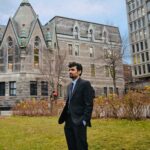
- Ghulam Jalani (PhD’15) is the Director of Research and Operations at Alentic Microscience, a diagnostic technology company. Having made a transition from academia to industry, he mentors graduate students through his involvement with the Canadian Biomaterials Society. He also revived the McGill Alumni Halifax chapter and, inspired by his own experience, runs a Facebook Group for Pakistani students to learn about study-abroad opportunities. He leads a volunteer team curating information for close to 45,000 members. Jalani grew up in rural Pakistan and has earned three degrees, including a PhD in mining and materials engineering. He is applying for several master’s programs in business and policy at McGill, and intends to become an entrepreneur.

- Caitlyn McConnell (BA’22, BMus’22) is studying classical voice performance, economics, and computer science. She founded and leads the Interdisciplinary Network of Students in Music to connect, support, and inspire music students in pursuing interdisciplinary studies and professions; this network has offered free events, workshops, and a mentorship program to 400+ students from 17 universities. In addition, she is a fund manager for the Montreal Social Value Fund and the editor-in-chief of the McGill Business Review. McConnell works part-time as a research assistant and performer. Currently, she is researching opera house strategies in Europe and North America. She hopes to study law, with a focus on the arts sector. “My two objectives with a law degree are to ensure freedom of artistic expression and to improve the livelihood of artists,” she said. “A legal education will provide me with tools to accomplish these objectives in the public or private sector, either through policy work in the arts sector or private legal practice in areas where artists face significant barriers.”
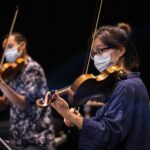
- A graduate of the Schulich School of Music, Tomo Newton (BMus’18, MMus’20) has performed at music festivals around the world. She plays with Ensemble Obiora, an ensemble of musicians of colour, and is currently living in Dubai, where she is performing at the World Expo. Outside of work, Newton started and manages a Montreal collective that organizes the cooking and delivery of homemade meals to shelters. To date, the collective has delivered more than 10,000 meals. She also serves on the boards of two non-profit organizations, Head and Hands and the Quebec Public Interest Research Group. “I choose to volunteer my time in the community because the health and happiness of my neighbours is the health and happiness of me,” she said. “The pandemic has demonstrated that the interconnectedness of our existence is undeniable. As poet Emma Lazarus said, ‘Until we are all free, none of us are free.’” Newton would like to would like to enter the Master of Public Policy program.

- Shirley Wang (BSc’20) studied Microbiology, Immunology, and Political Science. As managing editor of the McGill International Review, she led a team publishing more than 500 articles, podcasts, and videos per year. Wang also led the McGill delegation at the 2019 Commission on the Status of Women at the United Nations and worked as an environmental outreach officer in Saguenay. She is fiercely proud to be from Brampton, Ontario, and led a local team of youth researchers to help inform post-COVID public policy and city planning. Wang is currently working as the deputy outreach lead for one of the Government of Ontario’s COVID relief funding initiatives and as a research assistant at McGill’s Centre for International Peace and Security Studies. She aims to enter the Faculty of Law or pursue a Master’s Degree in Political Science. “I am looking forward to expanding my research on the ethics and laws of armed conflict, particularly with regards to just war theory and international humanitarian law,” she said.
Finalists to be interviewed in March
This year, close to 700 people applied for the McCall MacBain Scholarships, and 146 of them took part in regional interviews in November. Several dozen McGill alumni volunteered as regional interviewers, including Katrin Nakashima (BSc’77, BCL’81, LLB’81, and McGill Law Faculty Advisory Board), Indigenous rights lawyer Maggie Wente (BA’94), and former CEO & Partner of Sid Lee Inc, Bertrand Cesvet (BA’86, MBA’88).
“The interviews allow students to share their life experiences, the contributions they’ve made to their communities, and how these experiences have shaped their aspirations,” Nakashima said. “We look for students who act with kindness, integrity, interest in mobilizing others, and the courage to work towards meaningful change even when the circumstances are difficult.”
Following that round of interviews, 50 finalists were selected, while 30 others were awarded Regional Awards of $5,000 each. Four current McGill students earned Regional Awards: Taylor Lynn Curtis, Eyitayo Kunle-Oladosu, Ria Stevens and Jeremy Zwaig.
The 50 finalists, representing 28 Canadian universities, will take part in a final round of interviews in Montreal from March 24 to 26. During the interviews, they will meet with leaders from academia, business, government, and the social sector.
Up to 20 McCall MacBain Scholars will be chosen to begin their fully funded studies at McGill in September 2022. The scholarship will cover tuition, fees and $2,000 per month for living expenses, and provide mentorship, coaching and leadership development opportunities.
Finalists who are not selected as McCall MacBain Scholars will be eligible for a $10,000 Finalist Award for studies at McGill.
Applications for the third class of McCall MacBain Scholars, and the first cohort to include international students, will open in June 2022 for admission in September 2023.

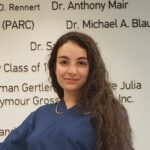 Ma Maison, which offers oral health care to seniors in their homes, and serves on the Faculty of Dental Medicine and Oral Health Sciences’ Equity, Diversity, and Inclusion Committee. She also represents the DMD program within the Widening Participation committee and co-founded the McGill Dentistry French Club, which offers French lessons to students. Bouferguene is applying to start a Master of Science with the Faculty of Dental Medicine and Oral Health Sciences.
Ma Maison, which offers oral health care to seniors in their homes, and serves on the Faculty of Dental Medicine and Oral Health Sciences’ Equity, Diversity, and Inclusion Committee. She also represents the DMD program within the Widening Participation committee and co-founded the McGill Dentistry French Club, which offers French lessons to students. Bouferguene is applying to start a Master of Science with the Faculty of Dental Medicine and Oral Health Sciences. cation and youth development. Brown-Walkus also started a non-partisan club for public policy discussions, served on the executive team of the McGill Pre-Dental Student Society, and worked as a program coordinator for McGill’s Indigenous Mentorship Program. She recently earned a Master of Science in Dentistry degree from the University of Toronto, where she wrote a thesis on First Nations perceptions of quality preventive oral health care in First Nations communities. Her goal is to enter the professional Undergraduate Dental Program (DMD) at McGill to improve dental care for Indigenous peoples across Canada. “I feel very honoured to be a finalist,” she said. “Getting to dental school has been a bit of a roller coaster and this opportunity has allowed me to reflect on that journey. My younger self is incredibly proud of where I am today.”
cation and youth development. Brown-Walkus also started a non-partisan club for public policy discussions, served on the executive team of the McGill Pre-Dental Student Society, and worked as a program coordinator for McGill’s Indigenous Mentorship Program. She recently earned a Master of Science in Dentistry degree from the University of Toronto, where she wrote a thesis on First Nations perceptions of quality preventive oral health care in First Nations communities. Her goal is to enter the professional Undergraduate Dental Program (DMD) at McGill to improve dental care for Indigenous peoples across Canada. “I feel very honoured to be a finalist,” she said. “Getting to dental school has been a bit of a roller coaster and this opportunity has allowed me to reflect on that journey. My younger self is incredibly proud of where I am today.”
I want to study McGill university because I like your work
I like the way your university encourages people. such a kind of thing crate intelligence and is like putting a foundation for the future, but my comment is that most of the students are selected from Canada based experience and this kind of opportunity needs to be provided for foreign students who face a lot of difficulties with the complicated working environment.